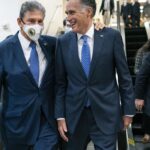Americans shouldn’t expect the Omicron variant to peak nationwide in coming days, the U.S. surgeon general warned Sunday, as Covid-19 cases continue to rise and put more pressure on hospitals.
“The next few weeks will be tough,” Dr. Vivek Murthy said during an appearance on CNN’s “State of the Union.”
The seven-day average for confirmed and suspected Covid-19 hospitalizations is at the highest recorded level, with about 155,958 reported Sunday, after topping old records last week, data from the U.S. Department of Health and Human Services show. The seven-day average for newly reported cases also reached nearly 808,000 a day on Saturday, the first time it has topped 800,000, data from Johns Hopkins University show.
The latest data are inflated by a surge in Texas cases reported at the same time after the state cleaned up and added to its 2020 case total. At the same time, the rise in at-home testing that is often not captured in state data reports has added to an incomplete picture of the true level of infections, health and data experts said.
Still, public health officials say they are cautiously optimistic after Covid-19 cases began to slow in some early U.S. hot spots this week, following a trend that appeared in South Africa and the U.K., where Omicron hit earlier.
Dr. Murthy warned during TV appearances that the pandemic wasn’t over. “The entire country is not moving at the same pace,” he said on CNN. “The Omicron wave started later in other parts of the country.”
He said the federal government is sending resources to hospitals struggling with staffing shortages and encouraging Americans to get vaccinated and boosted. “One thing that we’re learning during this surge is that our vaccines are still working very well to keep people out of the hospital and to save their lives,” he said.
Dr. Ashish Jha, the dean of the Brown University School of Public Health, said on “Fox News Sunday” that Covid hospitalizations have either peaked or will soon in New York, New Jersey and parts of New England and Florida. But he said the rest of the country hasn’t yet seen the worst of the Omicron surge.
On Thursday, the Supreme Court blocked the Biden administration’s Covid-19 vaccine-or-testing rules for large private employers, dealing a blow to one of the administration’s key tools for increasing vaccination rates. The court did, however, allow the administration to impose a vaccine mandate for more than 10 million healthcare workers whose facilities participate in Medicare and Medicaid.
Dr. Jha praised the Biden administration’s focus on boosting the supplies of Covid-19 tests but said the federal government’s public health messaging hasn’t kept up with changes in the virus. “It’s certainly making it harder for people to know what to do,” he said.
A new CBS News/YouGov survey showed Mr. Biden’s rating on handling of the pandemic is at its lowest point since he took office.
Only 49% of Americans think the president is doing a good job handling the virus outbreak, down from 67% in March of last year. In the survey, slightly more than two-thirds of respondents who said he wasn’t doing a good job said they felt that way because information from the government about the virus has been confusing. The survey of 2,094 U.S. adults between Jan. 12-14 had a margin of error of plus-or-minus 2.5 points.
On Sunday, Mr. Murthy defended the administration’s response to Covid-19 rapid test shortages, saying on ABC’s “This Week” that even though the Biden administration had increased supply over the past year, the Omicron wave “created an extraordinary increase in demand” leading to a shortage.
The Biden administration has announced plans to buy and distribute 1 billion rapid Covid-19 tests. Last week, the administration announced that starting Jan. 19, people will be able to order the first of the tests. People will be able to order up to four tests per household on covidtests.gov that will be shipped within seven to 12 days.
Maryland Gov. Larry Hogan, a Republican, said on CBS’s “Face the Nation” that his state is seeing early signs that the virus may be peaking there but criticized the federal government for buying up test kits for which his state had already contracted, rather than focusing on increasing production of new kits.
“We’re trying to get as much help as we can from the federal government, but quite frankly, they’re falling short,” Mr. Hogan said.
Other GOP lawmakers said Sunday that the Biden administration hadn’t provided enough tests, a key weakness in the president’s response to the pandemic. “The administration’s lost focus,” Sen. Bill Cassidy (R., La.) said on CNN’s “State of the Union.”
Omicron’s rapid spread through communities means many people are showing up at hospitals with other health problems before testing positive for Covid-19. The health department in New York, which has broken out data on this effect at the statewide level, has advised against discounting such infections as incidental or harmless, since it may not be apparent right away that Covid-19 was an aggravating factor for some patients.
The seven-day average for reported Covid-19 deaths is 1,776 a day, Johns Hopkins data show. Recent data disruptions have made it difficult to determine the trend in deaths, although the average is up more than 600 since before Thanksgiving, when the holidays caused reporting delays. The average for reported Covid-19 deaths briefly topped 2,100 in September, during the surge caused by the Delta variant.
Los Angeles County said more than 28,000 residents have died from cases linked to Covid-19 since the pandemic began almost two years ago.
The county’s public health office registered 66 deaths linked to the coronavirus Saturday, the biggest daily number since early last April and a fourfold increase from one week earlier. Most deaths linked to Covid-19 in the past week were among people who got infected after Dec. 20, when the new Omicron variant was widely circulating.
The public health office said the recent jump in hospitalizations and “the extraordinarily high number of new cases reflects worrisome rates of community transmission.”

A protest in Paris on Saturday against planned restrictions.
Photo: geoffroy van der Hasselt/Agence France-Presse/Getty Images
In France, lawmakers passed a bill supported by President Emmanuel Macron that bars the unvaccinated from entering restaurants, cafes and many other public venues, rather than allowing them to enter by showing a negative test.
The vote came after some 54,000 people on Saturday took part in protests in French cities against tightening restrictions on those who reject a Covid-19 vaccination, according to the Interior Ministry. That was about half as many people across the country as last week, when protesters vented against Mr. Macron’s recent comment that “the unvaccinated, I really want to piss them off.”
In the Netherlands, the government on Saturday relaxed some Covid-19 restrictions imposed in November when the Delta variant risked overwhelming hospitals. Although the number of cases linked to the Omicron variant is rising, hospitalizations are falling.
Dutch restrictions were eased for schools, sports, artistic and cultural activities, nonessential shops and contact-based industries such as hairdressers. Rules on the use of face masks were tightened.
In the U.K., the government said booster shots would be made available to 16- and 17-year-olds in England as it seeks to provide protection against the Omicron variant. Before the spread of Omicron, the state-funded National Health Service in England had limited booster shots to people 18 and older.
—Nick Kostov and Bojan Pancevski contributed to this article.
Write to Chad Day at [email protected], Eliza Collins at [email protected]. and Jon Kamp at [email protected]
Copyright ©2022 Dow Jones & Company, Inc. All Rights Reserved. 87990cbe856818d5eddac44c7b1cdeb8








